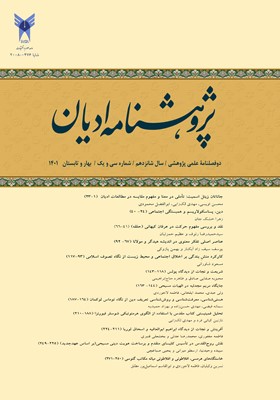عناصر اصلی تفکر معنوی در اندیشه هیدگر و مولانا
محورهای موضوعی : مسیحیت
یوسف سیف زاد آبکنار
1
![]() ,
بهمن پازوکی
2
*
,
بهمن پازوکی
2
*
1 - دانشکده حقوق، الهیات و علوم سیاسی، واحد علوم و تحقیقات، دانشگاه آزاد اسلامی، تهران
2 - عضو هیئت علمی موسسه پژوهشی حکمت و فلسفة ایران
کلید واژه: هیدگر, مولانا, تفکر, تفکرحصولی, تفکرحضوری, لوگوس, مابعدالطبیعه,
چکیده مقاله :
از نظر هیدگر تفکر را نمیتوان فقط به مابعدالطبیعه، علم و تکنولوژی، سوژهمداری، تمثل و منطقگرایی منحصر کرد. بلکه تفکر معنوی لوازمی دارد که مهمترین آن پرسشگری و بهراه افتادن در مسیر اندیشه است. از نظر وی تفکر و تشکر همریشه بوده و با لوگوس یا گفتار پیوند دارد. هرچند ویژگی اصلی تفکر این است که در طلب وجودی باشد که او را بهسوی تفکر فرامیخواند. از نظر مولانا نیز از طریق دانشهای نظری یا حصولی نمیتوان به معرفت حقیقی دست یافت. بلکه تفکر ذیل ادراک عارفانه یا حضوری قرار گرفته و بر یاد، شهود، ذوق و عشق دلالت میکند. از نظر وی لازمه اصلی تفکر، سلوک است که در مرتبه عالی آن، انسانِ کامل با اتصال به حق، به یقین و معرفت خواهد رسید. بنابراین علیرغم تفاوتهای آشکار آنها از نظر خاستگاه فکری و مبانی اندیشه، اما عناصر مشترکی نیز در اندیشه آنها به چشم میخورد. چنانکه هیدگر و مولانا معتقدند دلیلباوری و تعقلگرایی بهتنهایی نمیتواند به تفکر منجر شود. بلکه تفکر، شهودی یا معنوی بوده که از طریق انکشاف و گشودگی رخ خواهد داد.
For Heidegger, thinking cannot be limited to metaphysics, science and technology, subjectivism, representation, and logic. Rather, meditative thinking has requirements, the most important of which are questioning and getting on the path of thought. In his view, thinking (denken) and thanks giving (thank / danken) are cognate and are associated with logos or speech. However, the main feature of thinking is that it seeks an existence that invites it to think. According to Rumi, true knowledge cannot be achieved through theoretical or acquired knowledge. Rather, thinking is below mystical or by-presence perception and implies memory, intuition, taste and love. According to him, the main requirement of thinking is behavior, in the highest level of which, a perfect human being will attain certainty and knowledge by connecting with the truth. Thus, in spite of their obvious differences in terms of intellectual origin and principles of thought, but also common elements can be seen in their thought. As Heidegger and Rumi believe, the ratio belief and rationalism alone cannot lead to thinking. Rather, it is a meditative or spiritual thought that will occur through intuition and Openness.
_||_

